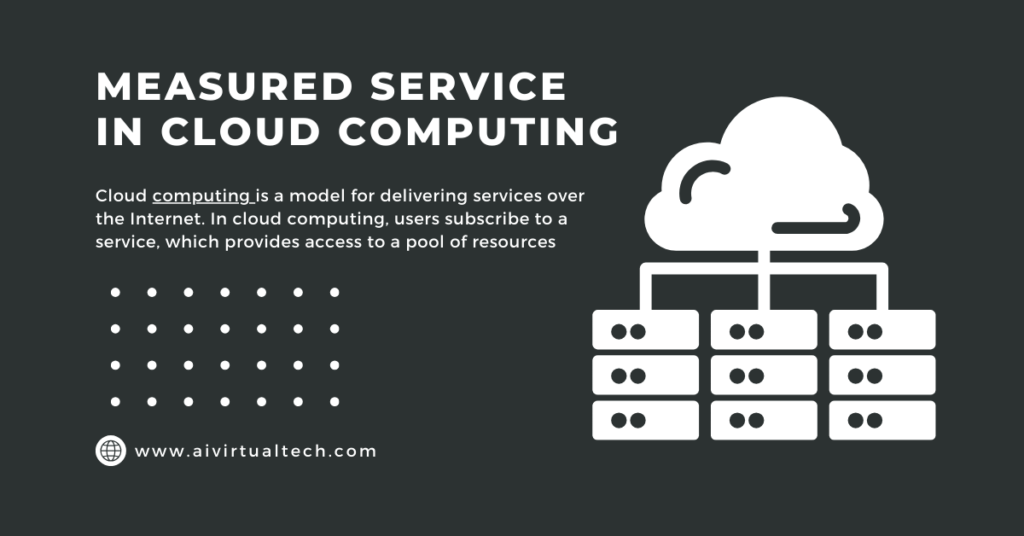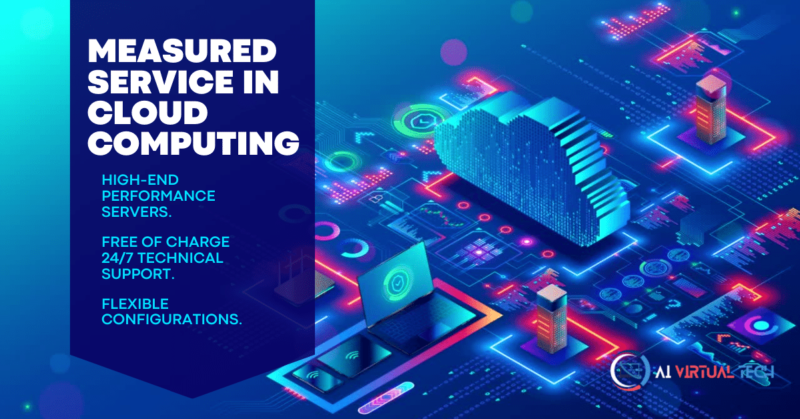Cloud computing is a model for delivering services over the Internet. In cloud computing, users subscribe to a service, which provides access to a pool of resources (such as processing power, storage space, and bandwidth) that can be used to run applications, store data, and more. This model allows users to access resources as needed without having to purchase or maintain their own hardware or software. The key advantage of cloud computing is that it can be used to give users a cost-effective and efficient way of accessing a range of services. In addition, the scalability of cloud services means that businesses can grow and adapt quickly to changes in demand, providing them with greater flexibility in terms of budget and resources.
What is cloud computing?
- Cloud computing, in simple terms, refers to the delivery of computing services over the internet on a pay-as-you-go basis.
- Rather than relying solely on local servers or personal devices, cloud computing allows users to access applications and store data remotely.
- This means that instead of storing files on physical hard drives or servers, they are stored in a virtual space known as “the cloud.”
There are different types of cloud computing models available today. The most common ones include Infrastructure as a Service (IaaS), Platform as a Service (PaaS), and Software as a Service (SaaS). - IaaS provides virtualized resources such as storage and networking capabilities for users to build their own IT infrastructure.
- PaaS offers developers an environment to develop, test, and deploy applications without worrying about underlying infrastructure management. SaaS delivers ready-made software applications accessible through web browsers.
The beauty of cloud computing lies in its flexibility and scalability. Unlike traditional methods where you have limited resources within your own hardware capacity, with cloud computing you can easily scale up or down based on your needs.
The different types of cloud computing
Cloud computing has revolutionized the way businesses operate by offering a wide range of services and deployment options. There are three main types of cloud computing: public, private, and hybrid.
Public cloud is the most common type, where resources are shared among multiple users over the internet.
This option is cost-effective and scalable, making it ideal for startups or small businesses with limited IT infrastructure.
Private cloud, on the other hand, offers dedicated resources to a single organization. It provides enhanced security and control but comes at a higher cost due to maintenance and management requirements.
Hybrid cloud combines elements of both public and private clouds. It allows organizations to take advantage of increased flexibility by seamlessly integrating their existing infrastructure with public cloud services. This option is beneficial for companies that need to balance security and scalability.
Each type has its own advantages and disadvantages depending on specific business needs. Understanding these differences can help organizations make informed decisions when adopting cloud computing solutions.
Pros and cons of cloud computing
- Cloud computing has revolutionized the way businesses operate by offering a range of benefits. However, like any technology, it also comes with its own set of drawbacks. Let’s explore both the pros and cons to get a better understanding.
- One major advantage of cloud computing is cost savings. By eliminating the need for physical infrastructure and maintenance costs, businesses can significantly reduce their expenses. This makes it an attractive option for startups or small businesses with limited budgets.
- There are also some potential downsides to consider when adopting cloud computing. One concern is security risks. Storing sensitive data on external servers raises concerns about unauthorized access or data breaches if proper security measures are not in place.
- Reliability is another factor that may impact businesses relying heavily on cloud services. Any downtime experienced by the service provider could result in disruptions and loss of productivity for users.
What is measured service?
Measured service is a fundamental concept in cloud computing that allows users to pay for the resources they actually use.
It provides a method of tracking and monitoring usage, enabling businesses to accurately allocate costs and optimize their resource consumption.
In simple terms, measured service involves measuring various aspects of the cloud services being utilized by an organization.
This includes metrics such as storage capacity, bandwidth usage, processing power, and more. These measurements are then used to determine the cost incurred by the user.
One of the key benefits of measured service is its ability to provide transparency and accountability in cloud computing.
By tracking usage and costs in real-time, organizations can gain insights into their resource utilization patterns and make informed decisions about scaling up or down as needed.
Measured service plays a crucial role in making cloud computing cost-effective and efficient for businesses of all sizes. It empowers organizations with greater control over their resource allocation while providing valuable insights for decision-making purposes.

How measured service works in cloud computing
Measured service is a key aspect of cloud computing that allows users to pay for the resources they use, rather than paying for a fixed amount of capacity. It provides transparency and control over costs by tracking and monitoring resource usage.
In cloud computing, measured service operates on a pay-per-use basis. This means that organizations only pay for the actual resources consumed, such as storage, processing power, or network bandwidth.
The measurement can be based on factors like time used, data transferred, or number of transactions processed.
To enable measured service in cloud computing, providers implement monitoring tools and mechanisms that collect usage data from each user’s account. These tools track various metrics related to resource utilization and generate detailed reports.
The collected data is then analyzed to provide insights into how resources are being utilized. Users can access these reports through dashboards or APIs provided by the cloud provider.
This allows them to understand their resource consumption patterns and make informed decisions about optimizing their usage.
Measured service offers several benefits in cloud computing. It promotes cost-efficiency by eliminating upfront investments in excess capacity.
Organizations only pay for what they actually use, which can lead to significant cost savings.
It enables scalability as users have the flexibility to increase or decrease their resource allocation based on demand fluctuations without any physical upgrades or downtime.
Measured service fosters accountability as both providers and consumers have visibility into resource consumption patterns. This promotes transparency and helps identify potential areas for optimization.
Measured service plays a crucial role in ensuring efficient resource management and cost optimization in cloud computing environments
The benefits of measured service
- The benefits of measured service in cloud computing are numerous and impactful. Measured service allows businesses to only pay for the resources they actually use, resulting in cost savings.
- With traditional IT infrastructure, companies often have to over-provision resources to ensure they can handle peak demand, leading to wasted capacity and unnecessary expenses.
- Measured service eliminates this inefficiency by dynamically allocating resources based on actual usage.
Measured service also promotes transparency and accountability. By providing detailed metrics on resource consumption, organizations gain a clear understanding of how their cloud services are being utilized. - This information can inform decision-making regarding resource optimization and budget planning.
Measured service empowers users with control over their cloud environment. Through self-service portals and dashboards displaying usage data, individuals can monitor their own resource consumption and make informed decisions about scaling or optimizing their applications.
The benefits of measured service in cloud computing include cost savings through accurate billing based on usage, scalability for dynamic resource allocation, transparency for informed decision-making , performance optimization through real-time monitoring ,and user empowerment through self-service capabilities
Summary
Cloud computing offers numerous benefits and flexibility for businesses of all sizes. In this article, we discussed the different types of cloud computing, along with its pros and cons. We also explored the concept of measured service in cloud computing and how it works.
Frequently Asked Questions (FAQS)
1. What is cloud computing?
Cloud computing is the delivery of on-demand computing services, including storage, databases, software applications, and more over the internet.
2. What are the different types of cloud computing?
There are three main types of cloud computing: public cloud (services offered by third-party providers), private cloud (exclusive use within a single organization), and hybrid cloud (a combination of both).
3. What are the pros of cloud computing?
Cloud computing offers flexibility, scalability, cost-effectiveness, easy access to data from anywhere at any time, automatic software updates, enhanced security measures provided by reputable providers.
4. Are there any cons to using cloud computing?
Some concerns include potential downtime if the provider experiences issues or outages and reliance on internet connectivity for accessing data.
5. What is measured service in relation to cloud computing?
Measured service refers to tracking resource usage in real-time and charging users according to their consumption levels.
6. How does measured service work in cloud computing?
Through monitoring tools and metrics systems deployed by the service provider which track factors like CPU utilization rates or bandwidth usage.
Conclusion
Cloud computing has revolutionized the way businesses operate, providing flexibility, scalability, and cost-efficiency. Measured service is an essential component of cloud computing that allows users to pay for only the resources they consume. By monitoring and tracking usage, measured service ensures transparency and enables businesses to optimize their operations.













